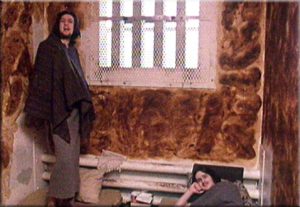
Il ministro della Giustizia David Ford ha affermato che 446.913 sterline sono state pagate a ditte esterne per eseguire le pulizie nella prigione di massima sicurezza di Lisburn.
Altre 55.738 sterline sono state utilizzate per acquistare attrezzature, come ad esempio macchine pulitrici industriali.
Più di 40 repubblicani, tra cui John Paul Wootton e Brendan McConville – incarcerati per la morte dell’agente di polizia Stephen Carroll -, sono detenuti nell’ala chiamata Roe House.
Più di 30 sono impegnati nella protesta, spalmando escrementi sui muri e sui pavimenti delle loro celle e vuotando le urine sui corridoi del braccio carcerario.
La protesta, avviata a maggio, intende chiedere la fine delle strip search. I POW vogliono l’introduzione di attrezzature elettroniche di scansione per rimpiazzare le umilianti perquisizioni corporali. I prigionieri accusano le autorità di rinnegare l’accordo di Maghaberry siglato nell’agosto 2010, dopo mesi di incontri con i mediatori.
Questa settimana, un gruppo che riprende il nome dell’Irish Republican Army ha rivendicato la morte della guardia carceraria David Black, collegando l’attacco armato con la protesta in corso nella prigione di Maghaberry.
Le informazioni riguardo ai costi della pulizia delle celle sono stati forniti in risposta ad una domanda scritta formulata dal parlamentare dell’SDLP Pat Ramsey.
Ramsey, che ha visitato Roe House insieme ad una delegazione del suo partito, ha affermato: “L’ammontare dei soldi spesi nelle pulizie potevano essere investiti meglio in uno scanner che, spero, potrebbe risolvere l’attuale protesta in corso a Roe House”.
Finlay Spratt, presidente della Prison Officers’ Association, ha detto che “è una condizione tremenda per il personale che deve lavorare nella prigione ma dimostra il loro impegno e dedizione. La gente impiegata altrove semplicemente non lavorerebbe in tali condizioni, ma che scelta hanno le guardie carcerarie? Se non lo fanno, non ci sarebbe nessuno a controllare i prigionieri”.
Prison dirty protest costs revealed
Justice minister David Ford said the £446,913 had been paid to external companies which have been carrying out work at the high security jail in Co Antrim.
A further £55,738 has been used to buy supplies such as a specialist industrial absorbent, said the minister.
More than 40 dissident republicans including John Paul Wootton and Brendan McConville who were convicted of the murder of police constable Stephen Carroll in 2009, have been segregated and are held at Maghaberry’s Roe House.
Just over 30 are involved in a no wash dirty protest smearing excrement on the walls and floor of their cells as well as emptying urine into the prison landings.
The protest, which started last May, is in opposition to strip searches. Inmates want electronic scanning devices to replace what they claim are humiliating full body searches. Prisoners have also accused the authorities of reneging on an agreement which was signed in August 2010 after months of talks with mediators.
This week, a group calling itself the new IRA claimed responsibility for the murder of 52-year-old prison officer David Black and linked his shooting to the ongoing protest.
Information on the cell cleaning costs was released in response to a written question from SDLP MLA Pat Ramsey.
Mr Ramsey, who has visited Roe House as part of an SDLP delegation, said: “The amount of money that has been spent on cleaning could be better spent on a scanner which I would hope would resolve the current protest at Roe House.”
Finlay Spratt, chairman of the Prison Officers’ Association, said: “It is terrible conditions for the staff who have to work in the prison but, it just shows that the dedication and commitment they have. People in other industries would simply not work in those types of conditions, but what choice do prison officers have? If they don’t do it there would be nobody to look after the prisoners.”